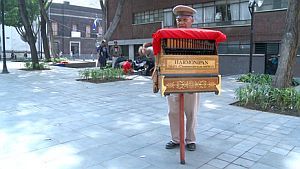Mexico City, Mexico - Don Odilon Jardines has spent a lifetime at the organ grinder's handle. Now 73 years old, he is one of the oldest organ grinders still on the streets of Mexico City. For him, the organ's melody has a melancholic charm as it reverberates around the neighborhoods he visits in an evening.
But he knows that, in today's Mexico, not everyone agrees. As tastes change, fewer people are prepared to put their hand in their pocket and bring out pesos to tip the organist for his nostalgic lament.
"I am an organist down to my bones, it's the only thing I've known," Odilon says, recalling how his family were so poor he slept on the floor as a child with newspapers and theatre billboard posters as his blankets. He says the job has provided a dignified living for him and allowed him to educate his children.
"I've been able to provide for my family so that all my children went to university. My grandson is a doctor and my son is a government lawyer. I feel very proud of them."
Pristine Condition
The tradition of organ grinding is still part of his family, though. Odilon passed the knowledge of caring for and maintaining the instruments to his son-in-law, Roman Dichi. Roman took to the role immediately. He now leads the Organ Grinders' Union of Mexico City and travels the country to perform at private parties.
He believes the trade is dying, not because the tradition itself has been lost but because most organ grinders do not work using sufficient care and attention. Roman has learned various skills, including carpentry, metalwork and upholstery in order to maintain his antique instrument in pristine condition.
 |
| Seventy-three-year-old Don Odilon Jardines has been an organ grinder his entire life and is one of the oldest still on the streets of Mexico City. |
"They deteriorate without proper maintenance. Sometimes you find that people take pieces from one organ to use in another," he says in his workshop, where he also repairs others' damaged organs to boost his income. "Many just see this as a money-making machine," he explains as he replaces the pipes on a smaller Guatemalan-made wooden organ.
'Pros and Contras'
He complains that some organists do not wear the proper uniform or respect the traditions that saw them officially recognized by the government of Mexico City several decades ago. Rather, he says, too many consider it simply a glorified form of begging: "I'm doing an activity for which I earn a small tip from people."
"It's not begging. But unfortunately too many people still see it in those terms. They just turn the handle and then stick their hands out for payment. This vocation can live on, but it all depends on the people who own the organs. They have to preserve them, treasure them. Some don't even know the names of the songs they're playing."
He shows us a local newspaper article that suggested some organists were in fact carrying around hollow boxes with CD players inside. Incidents like that, he says, damage their reputation. Like his father-in-law before him, Roman Dichi has tried to instil the right approach towards the dying art in his own daughter's husband, David.
"The job has its pros and its contras," says the 19-year-old as the two men try to rustle up some tips by playing at a set of traffic lights on the outskirts of Mexico City. "It's nice to bring a smile to people's faces and let them remember times past. It's good to be on the streets, among the people," he says, showing the same kind of appreciation for his trade as Roman.
Odilon, Roman, and David - three generations of organ grinders from the same family - are all too aware it is no longer the 1930s, when German immigrants first introduced the wood and brass instruments to Mexico.
Monkeys
Whether it's people's iPhones or their car radios, the organists know they're fighting a losing battle in terms of capturing the public's musical interest. On top of that, when times are tough economically those who do appreciate the music are less inclined to tip.
But in general, they make enough to survive. Many people still enjoy the piped music or want to lift their children up to show them inside the beautiful, hand-crafted machines. For his part, Odilon Jardines - one of the founding members of the city's organ grinders' union - is adamant the tradition will last.
"This vocation can live on, but it all depends on the people who own the organs. They can't just rent them out for money. They have to preserve them, treasure them."
Odilon remembers a time when a monkey would accompany the organ grinder on the city's streets to collect the tips in a hat. Naturally, that tradition disappeared some time ago. But it will need people as dedicated to their work as him to ensure the organist doesn't vanish altogether too.
Original Story


